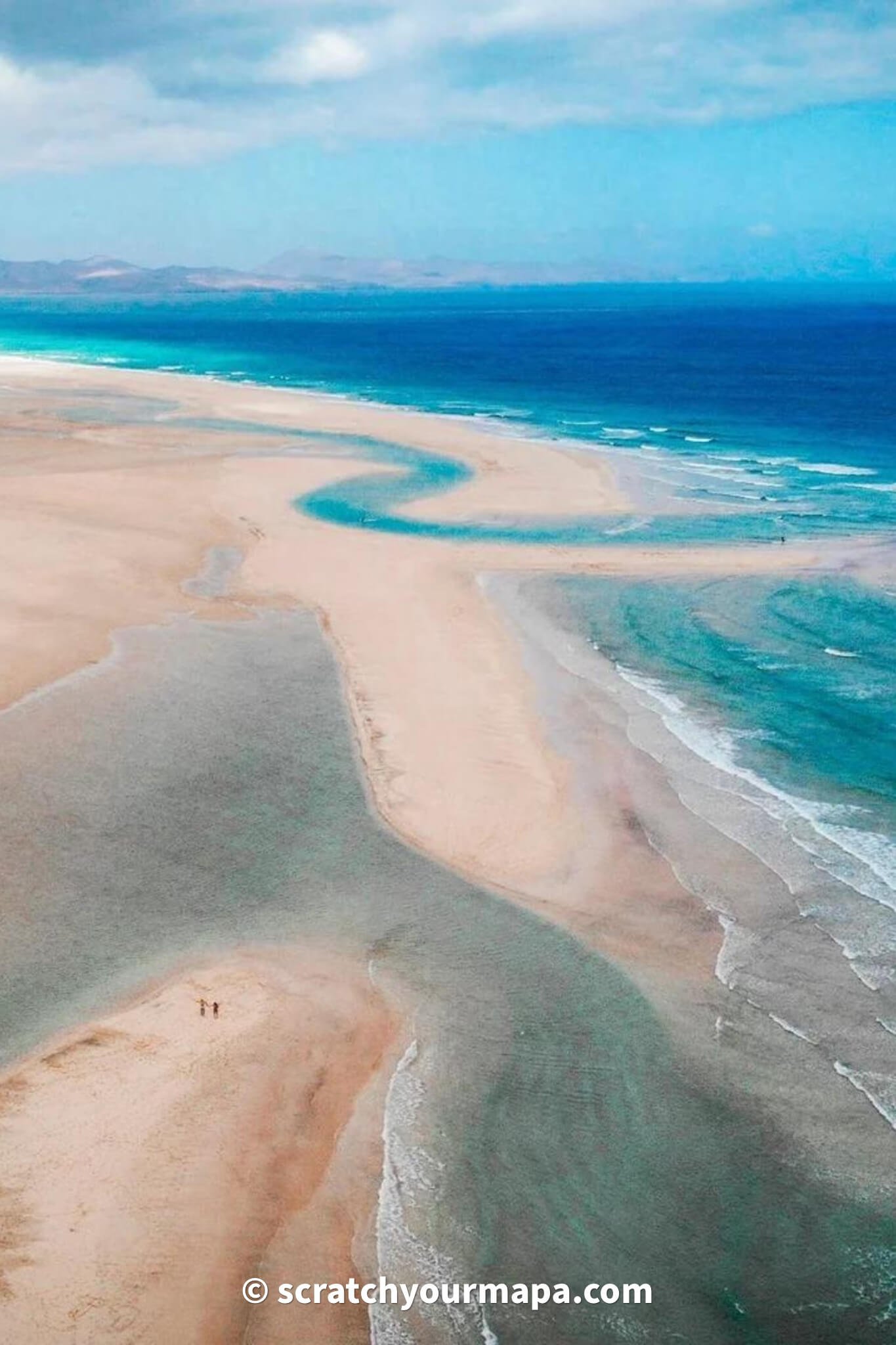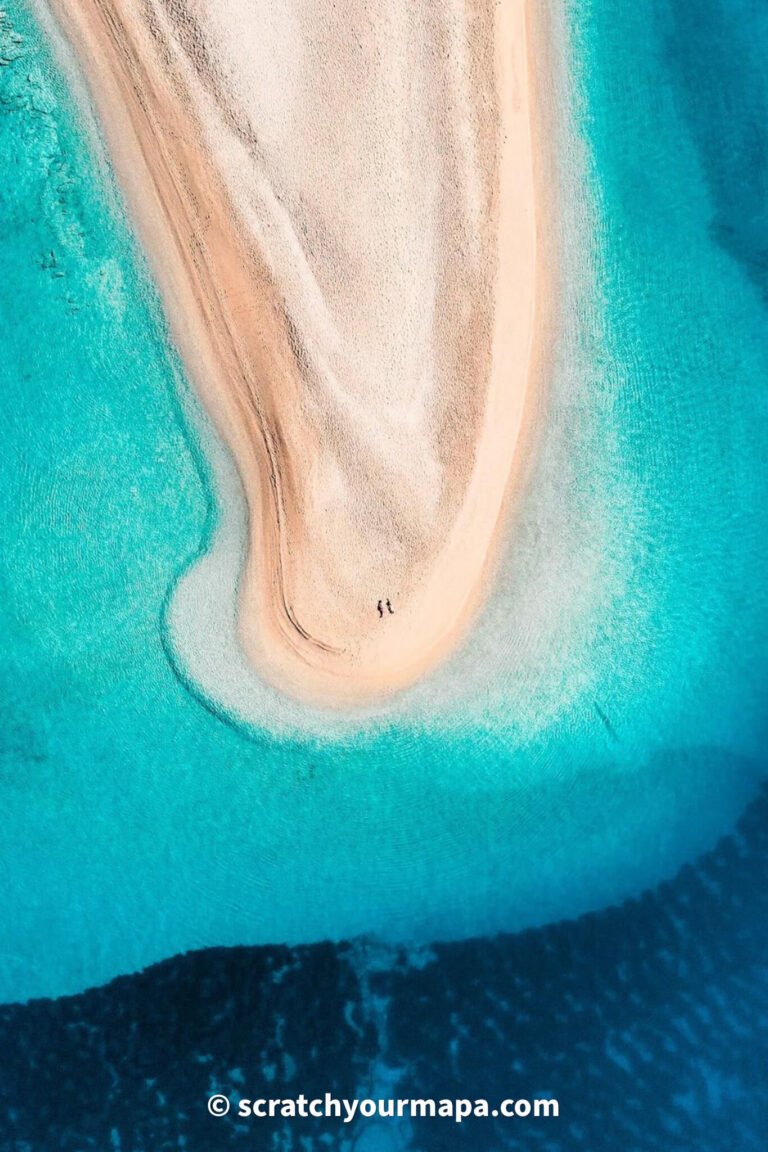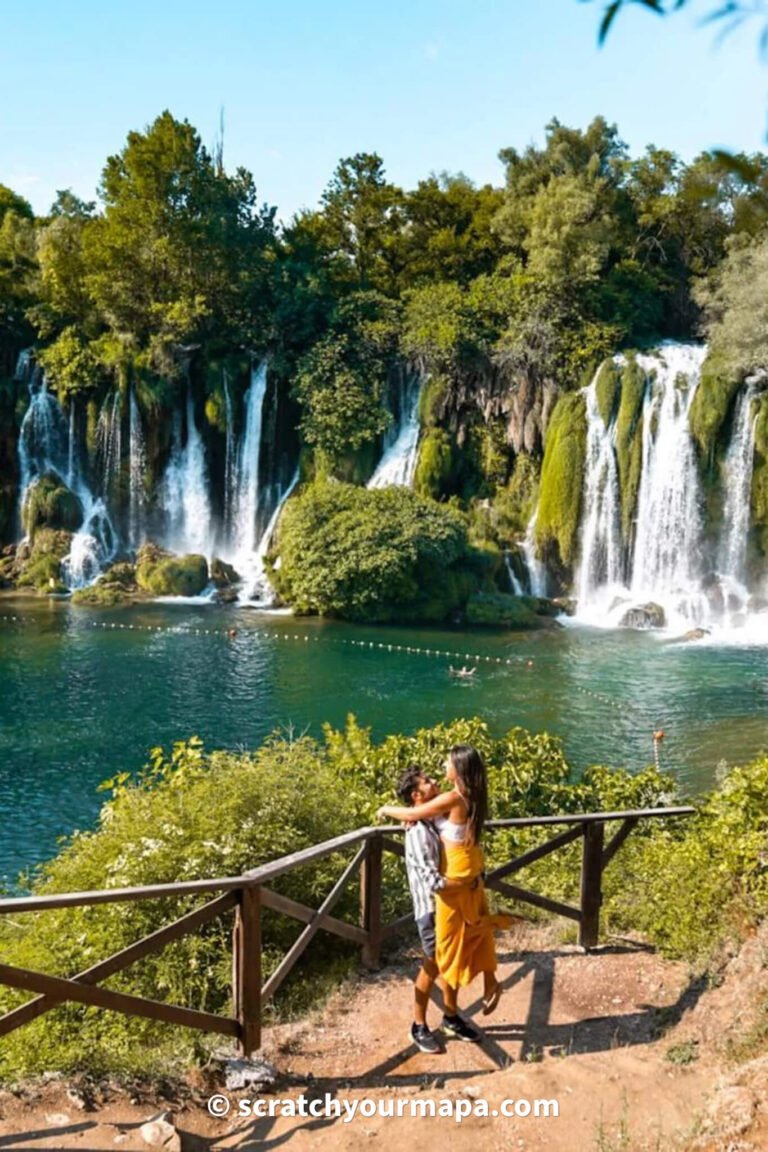The Ultimate Canary Islands Travel Guide: Discover Paradise in Spain’s Enchanting Archipelago
Have you ever heard of the Canary Islands in Spain? In this comprehensive Canary Islands travel guide, we'll explore this 7-island archipelago, one of the most underrated areas on the planet.
While most islands are known for their beaches, these ones offer so much more. Want to hike to the top of a volcano? How about getting lost in a foggy jungle? Looking for adventure? Or perhaps a weekend of beaches and partying? The Canary Islands have it all.
We spent a full two months exploring all 7 of the main islands, as well as 2 smaller ones. Each island has its own charm and is worth a visit, which is why we're here to help you choose which of the Canary Islands is best for you!
*Please note that this blog post may contain some affiliate links, which we make a small profit on, at zero cost to you. Links are only used on products & services that we've used and believe in, to give you the best buying experience. Purchasing from these links helps us to continue providing free travel guides for you- so thank you for your support!
Our Travel Planning Recommendations
✈️ Skyscanner (flights)
🛏 Booking.com (hotels)
🎫 Get Your Guide (tours)
🎟 Ticket Master (events)
📸 Best Buy (equipment)
🚗 Rental Cars (car rentals)
🚝 Train Line (train tickets)
🚌 Bus Bud (bus tickets)
🚢 Direct Ferries (ferries)
🛳 Cruise Direct (cruises)
📍 Where are the Canary Islands in Spain?
Spain has two sets of main islands- the Balaeric islands, and the Canary Islands. While the Balaeric Islands are located right off the coast of mainland Spain, the Canary Islands are actually a bit further.
The archipelago of the Canary Islands in Spain is actually located off the north western coast of Africa. This is great because they are still part of Spain, but experience much better weather than the mainland.

Even though they are part of Spain, the Canary Islands are located off the coast of Africa.
Canary Islands Travel Guide: How to Get to There
Despite their odd location, the Canary Islands in Spain are actually quite accessible. You can reach them by flight, ferry, and cruise ship.
✈️ Flying to the Canary Islands in Spain
Many cities throughout Spain, as well as all over Europe have direct flights to the majority of the islands. The two cheapest and easiest islands to get to are Tenerife and Gran Canaria, but there are also plenty of other countries with direct flights to the islands of Lanzarote, Fuerteventura, and La Palma.

Flying into or out of Tenerife gives you the most stunning views.
Flight Tip: With Skyscanner you can put from "your city" to "Spain", and then compare the flights for different islands. Also, you can check the calendar to see which are the cheapest dates the different islands!
Search for a flight to the Canary Islands:
⛴ Taking a Ferry to the Canary Islands in Spain
Another way to visit the Canary Islands is by ferry. Although it is much more common to take ferries within the Canary Islands, there are ferries that go from the mainland to a few of the different islands.
Ferries go from Huelva to both Gran Canaria and Tenerife a few times a week, and take about 32-34 hours. Tickets for foot passengers start at 121 euros and for cars start at 345 euros.
We personally think that flying is much easier when it comes to visiting the Canary Islands in Spain. However, if you aren't a fan of flying, then this mini cruise may be for you.



All of the islands are connected by ferry.
🛳 Cruising to the Canary Islands in Spain
Due to their location, it is actually very common for cruise ships to stop in the Canary Islands.
Many will stop there on Transatlantic Crossings, usually going from Miami to Europe or vice versa. These happen usually in the spring when ships are relocating from the Caribbean to Europe for the summer, or in the fall when ships are heading back to the Caribbean for the winter.
Cruise ships usually stop for just a day in a few different islands, the most popular ones being Tenerife and Gran Canaria, but also sometimes Lanzarote and La Palma. There are also local European cruise lines that stop in the Canary Islands on a more regular basis.

A lot of cruise ships stop in the Canary Islands during Transatlantic crossings.
Canary Islands Travel Guide: Entry Requirements
Now that you know how to get to Spain's incredible archipelago, it's time for an important part of our Canary Islands Travel Guide, the requirements in place to travel there.
When visiting the Canary Islands, the restrictions to enter are the same as mainland Spain. Here are a few things to keep in mind.
🛂 Visa Requirements for the Canary Islands in Spain
There are many citizenships that can enter Spain visa-free. Travelers from the EU, Switzerland, Norway, Liechtenstein, and Iceland can enter with zero restrictions, while those that don't need a Schengen visa can visit for up to 90 days in a 180 day period.
The 90/180 Rule
It's important to note that the 90 days are valid for all countries in the Schengen area, For example, if you spend 20 days in Italy (also part of the EU), you will then only be able to spend 70 days total in Spain within that 180 day period.
We use the Schengen visa calculator, which is helpful for those planning on traveling in and out of the EU for a long period of time.
Schengen Visas
For those that are planning on staying longer, or those that are from a country that don't get visa-free access, they will need to in fact apply for a Schengen Visa. Check out the list of countries that need to get a Schengen Visa so that you can know if you'll have to get one or not.
How To Travel Cheaper and Better in 15 minutes!
How much more would you travel, if it costed you less resources?
With our Free eBook, you will learn how to save money and time on your future trips. Plus, you'll see the exact system we use.
Grab your copy for free when you sign up for our newsletter 👇

Canary Islands Travel Guide: Local Adjustments
The next part of our Canary Islands Travel guide is something we put in all of our destination articles, which are the "know before you go" details.
Here are a few of the local adjustments to keep in mind while traveling to the Canary Islands in Spain.
🗣 What Language Is Spoken in the Canary Islands?
The official language in the Canary Islands is Spanish. However, the Spanish in the Canary Islands is a little different than the Spanish spoken on the mainland. They speak much faster, and can be a bit more difficult to understand, They actually share more in common language-wise with the Caribbean than they do with Spain.
🇬🇧 Do People Speak English in the Canary Islands?
Many of the islands have a big influx of German and English tourists. Because of this, you'll find that the more touristy areas have a lot of signs and menus in multiple languages, as well as many English and German speakers.
💶 What Currency is Used in the Canary Islands?
The currency used in The Canary Islands is the same as the rest of Spain, which is the euro. Most places takes credit card, so you won't need to carry too much cash on you, unless you are taking public transportation.
🔌 Outlets in the Canary Islands
The Canary Islands use the same plugs as the rest of Europe, which are plug types C, E, & F. The standard voltage in The Canary Islands is 220V and the standard frequency is 50Hz.
🚰 Can You Drink the Water in the Canary Islands?
When you go to restaurants in the Canary Islands you will never receive tap water. Many say that you can't drink it, or they simply won't offer it. However, we drank plenty of tap water throughout the Canary Islands in Spain, and it is perfectly safe to consume.
💸 Tipping in the Canary Islands
The tipping culture in Spain is pretty much inexistent. If you are traveling around the Canary Islands it is not common to tip, unless it is a very nice restaurant, or has excellent service. If this is the case people will usually leave one or two euros.
However, when you visit some more touristy areas like the south of Gran Canaria or Tenerife, it is much more common for people to leave 10% or for there to be a service charge on top of your bill.

Want To Learn How To Get Paid To Travel?
We'll teach you everything you need.
Canary Islands Travel Guide: Comparing Each of the Different Islands
No Canary Islands travel guide is complete without mentioning each and every island in the archipelago. Luckily, we've had the pleasure of visiting each and every one! That's why we're going to break down what makes each one special.
❣️ What is the Nicest Canary Island to Visit?
We'll be honest- there is not a single part of the Canary Islands in Spain that we did not enjoy! Each island has its own beautiful landscapes and overall atmosphere to it. We're going to share a bit about each island, so you can choose which of the Canary Islands is best to visit for you.
Don't have time to read the whole article and want to save it for later? Just pin it!



🎉 Tenerife
Tenerife is the biggest and most popular of all of the Canary Islands in Spain. It is the most well connected to the rest of the islands, as well as with other cities throughout Spain and the rest of Europe.
In the north of Tenerife there is a national park full of greenery. In the south, there are a ton of touristic parties happening, and the capital is in the middle, which is Santa Cruz de Tenerife. Tenerife is home to the famous Teide Volcano, which is so grand, that it can actually be seen from a few other islands in the area!



Tenerife is famous for its enormous volcano, El Teide.
The island of Tenerife is great to visit for all types of travelers from families to young party goers. It is home to the famous Carnaval in February, and has a great mix of landscapes from black sand beaches to green mountains.
🐪 Gran Canaria
Gran Canaria is another one of the islands that kind of has a bit of everything, and in our opinion, is the most well rounded.
The island of Gran Canaria has mountains, forests, beaches, caves, natural pools, and even sand dunes that will make you feel like you are in the middle of a desert! The north is where the capital is, and is perfect for young backpackers or those working and traveling.



Gran Canaria has a wide variety of landscapes.
The south is full of more families and partiers of all ages. There is truly something for everyone in Gran Canaria, and a wide variety of activities for all types of travelers.
🌌 La Palma
The island of La Palma had a huge volcanic eruption in 2021, and it definitely suffered from lack of tourism. However, now the island is back, and there are plenty of great reasons to visit.
La Palma is located in the north west of the archipelago. Because of this it isn't quite as visited as Tenerife or Gran Canaria, but it does attract a lot of German travelers.



La Palma has natural pools, colorful towns, and a village built into a cave!
Some of our favorite things about La Palma are the steamy volcano, lush green parks, salt flats in the south, and one of the most beautiful views above the clouds. La Palma also has a super cute capital city, and a fishing village built into a cave!
🌋 Lanzarote
Lanzarote is truly unlike any of the other Canary Islands. This island has over 100 volcanos, and even a volcanic winery!
This windy island is great for surfers, and also has a variety of other cool landscapes like caves and natural pools. Lanzarote is home to a famous artist called Cesar Manrique, and you can enjoy various venues throughout the island like a cactus garden, museum, house, and cavern.



Lanzarote has over 100 volcanos!
Lanzarote is located in the far north east of the archipelago, but is also very close to the islands of Fuerteventura and La Graciosa, giving you an endless amount of things to do.
🏝 Fuerteventura
Looking for the best beaches in the Canary Islands (and in Spain)? Well, Fuerteventura is largely plain, with very little greenery. However, it is home to stunning Caribbean-like beaches, and one of our favorite natural pools.
While many other islands have a lot of Germans, Fuerteventura is home to a big influx of Italians on the island. Head to popcorn beach in the north, the window caves along the western coast, or the beautiful beaches in the south.



Fuerteventura has the best beaches in the Canary Islands.
Fuerteventura is between Lanzarote and Gran Canaria, and is also super close to Isla de Lobos, which is the perfect day trip to check out.
🌿 La Gomera
If you like hiking and lush greenery then La Gomera is the place for you. This tiny round island is super underrated, and only really popular with Germans and hippies, who have fallen in love with its beauty.
The entire center of the island is a national park, and will make you feel like you've teleported to another country. La Gomera is full of hidden gems like epic viewpoints, black sand beaches, and a private restaurant built into a cave.



The island of La Gomera has the best views of El Teide in Tenerife.
We rented a van here and truly fell in love with this beautiful island. Situated just west of Tenerife, it has the best views of El Teide Volcano, and is a great getaway from the larger and more popular island that more tourists flock to.
🌊 El Hierro
This is the smallest of the principal Canary Islands, and the least visited. However, we absolutely fell in love with El Hierro.
It is super easy to get around, and can actually be hiked across in just 10 hours! El Hierro has gorgeous views, epic waves, and the world's smallest hotel. There is zero nightlife, but it is a great getaway to experience some of the best hidden gems that the Canary Islands has to offer.



El Hierro is a tiny but underrated island.
El Hierro can only be reached by coming from the islands of Tenerife or Gran Canaria. If you want a quiet getaway, then this is definitely the right island for you.
🚤 La Graciosa
Now that you know all about the main islands to visit, here are two other islands that you can visit as day or weekend trips from the other islands.
La Graciosa as a whole is a protected park, and can be visited for a day trip, or for a few days from the island of Lanzarote.



La Graciosa is a protected area with beautiful beaches.
This island has great hiking trails, beautiful beaches, and a cute port town that will make you feel like you've teleported to Greece.
⛵️ Isla de Lobos
This tiny island is a national park, and can only be visited on a few hour boat trip from Fuerteventura.
The protected area has stunning turquoise waters, contrasting the dry rocky landscapes across it. You can climb to the top of the hill for beautiful views, or simply enjoy swimming in the natural pools created by the surrounding sea.



Isla de Lobos is full of natural beauty.
We loved visiting here on a day trip, and we wrote a full article about what to expect while visiting here.
Canary Islands Travel Guide: Moving Around
Our Canary Islands travel guide hopefully has now helped you choose which Canary Island is best for you! Whether it's getting you around the island of your choice, or getting you from one island to another, we're here to help.
Moving around the Canary Islands is truly a pleasant and easy experience, no matter which way you decide to do it. Here are the different options for traveling around the Canary Islands in Spain.
⛴ Traveling the Canary Islands by Ferry
The Canary Islands are all connected by ferries, running by the two companies of Fred Olsen and Armas Navierras.
Tenerife is the main hub, connecting to the islands of La Palma, La Gomera, Gran Canaria, and El Hierro. Fuerteventura has ferries running to Gran Canaria and Lanzarote, and La Palma has service between La Gomera and El Hierro.
Ferries are actually the same (if not more expensive) than flights. However, they are a good way to go if you have a lot of luggage, are traveling by car, or aren't a fan of flying.
Popular ferry routes to book:

You can easily sail from island to island via ferry.
✈️ Traveling the Canary Islands in Spain by Flight
Some of the best flights we have ever taken were in the Canary Islands in Spain. Flights are super short, have great views, and are very affordable.
What Airlines Fly Between the Canary Islands?
There are two main companies that do inter-island flights, which are Binter and Canary Fly.
Both airlines are super budget friendly, and include checked and hand luggage! Even overnight luggage only goes for about 1 euro a kilo, which is extremely affordable.
Airports are small and quick, making it feel like you're essentially hopping on a bus. Not only that, but the views on flights (especially to and from Tenerife) are just stunning!

There are amazing views flying over the Canary Islands in Spain.
🚗 Do You Need a Car in the Canary Islands?
Hands down the best way to explore any of the Canary Islands in Spain is by car. We rented a car in each island that we went to, and the process was seamless and affordable. While you can definitely get around by buses and taxis, it'll end up being more expensive and time consuming to get around that way if you want to do a lot of things while visiting.
You can also rent a car on one island and take it on the ferry to other islands, but we found it to be more expensive that way.
Here's what we use:
Canary Islands Travel Guide: Local Food & Drink
Other than comparing the different islands, this is our favorite part of our Canary Islands travel guide! While the Canary Islands are part of Spain, they also have plenty of their own flavors and dishes to look forward to.
🥘 What is Typical Canarian Food?
The cuisine in the Canary Islands has a lot of influence from Spain, but also has its own island specialties. Not only that, but each island has some of their own dishes! Here are some of our favorite dishes to try throughout the Canary Islands in Spain.
- Seafood: The seafood in the Canary Islands is super fresh. Take advantage of the fresh catches that the local fisherman bring in.
- Lapas: This is a small shellfish that we've only seen in the Canary Islands. It is round, and a bit more tough and rubbery than mussels and clams.
- Cazuela de Mariscos: This is one of our favorite dishes in the Canary Islands! It is seafood cooked in garlic, usually including shrimp, mussels, and other shellfish.
- Gambas al Ajillo: shrimp cooked in garlic- a staple in both mainland and the Canary Islands.
- Mojo: This sauce is served normally with bread on the table before your meal. There are two types of this garlic based sauce- one is green (made with cilantro or avocado) or red (made with red chile peppers).
- Papas Arrugadas: These small round potatoes are served as an appetizer or side dish, and come with mojo sauce.
- Gofio: This is a popular pulverized cereal that you can find across the Canary Islands. It can be used as a topping, or as the base for some soups and stews.
- Queso Asado: We can't get enough of this tasty white cheese that is grilled, and usually topped with some sort of honey, jam, or mojo.
- Local Cheese: Each island has its own local cheese particular to that island. Whatever island you visit, this is a must.
- Quesadilla: This is a product that is particular just of El Hierro. It is a sweet cake, and the round design is also a symbol across the island.
- Almogrote: This is a cheese spread made with peppers, and is found only on the island of La Gomera.


Fresh seafood is one of the highlights of the Canary Island cuisine.
Canary Islands Travel Guide: Safety
Before traveling anywhere, it's important to take the proper precautions for staying healthy and safe during your travels. Not only are we including the safety in our Canary Islands travel guide, but you can actually find this in every single one of our destination guides.
👮🏻♀️ Are the Canary Islands in Spain Safe?
The Canary Islands are very safe, and have low levels of crime, especially in the smaller islands. There is no danger in walking around at night, or traveling solo. Unlike big cities in Spain like Madrid and Barcelona, you won't need to worry about pickpocketing or any other criminal acts.
The Canary Islands are becoming more and more popular for digital nomads because of how friendly the people are, and it's an area of the globe where you'll be pleasantly surprised by the hospitality.
Canary Islands Travel Guide: Other Things to Know About Visiting
Now you know almost everything you need to know for traveling around the Canary Islands in Spain. But don't go anywhere! We have one final part of our Canary Islands travel guide to share with you. Here are a few other things to know while visiting.
📆 When Should I Visit the Canary Islands in Spain?
The Canary Islands are the perfect winter getaway, as they are much warmer than the mainland of Spain (and Europe is general).
Truthfully, the Canary Islands are amazing to visit year round, as they are decently warm in the winter, and never get too hot in the summer. If you'd like to experience some of the amazing natural pools then the summer is the best time, and if you love large waves and a mix of hot and cooler climates, then the winter is a great time to visit.
February is our favorite month because there are amazing carnival celebrations in Tenerife and Gran Canaria. You really can't go wrong for a time to visit the Canary Islands though, it really just depends on your travel intentions.

The Canary Islands have beach days year round.
☀️ Weather & Packing for a Trip to the Canary Islands in Spain
Depending on where you are going, you can experience hot sunny days any time of the year. Certain areas experience more rain such as the north of Gran Canaria, and the national park of La Gomera. Meanwhile, you can even see snow at El Teide, or the top of La Palma!
When traveling to the Canary Islands in Spain, the most important thing is to really be prepared for all types of weather. A swimsuit, good pair of sneakers, and light jacket are our top 3 suggestions for packing, as well as a strong sunscreen and reusable water bottle.



There are a variety of different climates and landscapes throughout the Canary Islands in Spain.
Depending on the type of trip you'd like to have, and which island you choose, will greatly impact how you should pack for your trip though. We suggest reading our full guides to each island before traveling so that you can know how to properly pack for your trip.
🎒 Packing List for the Canary Islands
Here is our general packing list for the Canary Islands in Spain:
- Sunscreen
- Sunglasses
- Towel
- Bathing Suits
- Light Jacket for places of higher elevation
- Flip flops (our favorites are Havaianas)
- Zippered bag or backpack (here are our top picks for backpacks for travelers)
- Sneakers (there are some amazing hikes)
- Nicer beachy clothing to go out in (some clubs have dress codes)
- Action Camera (for all water activities) we use the Insta 360 X3 because it's small & waterproof
- Power Bank (we use Anker power banks, as they are super long lasting and sturdy)
- Drone (You can get epic shots from above. We use the Mavic Mini 4 Pro because it's super light and has great quality)
- Camera (we use the Sony A7Riii)
- Standard Lens for a dynamic range (we use the Sony GM 24-70)
- Wide Lens to capture great panoramas and astrophotography (we use the Sony GM 14 F1.8)
- Telephoto Lens to capture the landscapes up close (we use the Sony GM 70-200)
- Tripod to get pictures while no one is around or for multiple shots from far away (We use the JOBY Rangepod Tripod)
- Waterproof Phone Pouch (we use the Casemate Waterproof Phone Pouch)
- Dry Bag (for the water excursions)
- Travel Adapter (we use Insignia travel adapters as they are affordable and reliable)
- Water Bottle (we use Cafago Water Bottles because they hold the temperature well)
- Travel toiletries (our favorites are from Sheer Alternatives because they're all natural and 100ml)
🤔 Are the Canary Islands Worth Visiting?
We hope that if you learned anything from our Canary Islands travel guide, it's that the Canary Islands are absolutely worth visiting! Each island has its own charm, and no matter what kind of traveler you are, we're sure you'll love Spain's epic archipelago.
Whether you like relaxing on the beach, doing adventurous activities, or partying the night away, there is something for everyone in the Canary Islands.




The Canary Islands are so worth visiting!
⏳How Long Should I Spend in the Canary Islands?
The Canary Islands have so much to offer, and you could easily spend a few months exploring all that they have to offer! We spent 1 week in each island, and found that it was the perfect amount of time to truly explore each island.
If you're looking for a quick trip, you can see the majority of the highlights in just 3-4 days on each island. But if you like to take it slow, or are working and traveling like us, then we'd recommend a week in the smaller islands, and a few extra days in the larger islands.





You can easily spend several weeks in the Canary Islands.
Travel Planning Tools
Here are some useful tools that you can use for planning your upcoming trip!
Now you know everything there is to know about visiting the Canary Islands in Spain! So which one do you think you'd like to visit? Let us know down in the comments!
If you still can't decide and want to learn more, make sure to check out each of the Canary Islands guides we have for the individual islands! We spent one week in each, and explored them pretty fully.
Want to travel and need help getting your trip organized? Leave the work to us! Now with Scratch Your Mapa Scratch Your Mapa Travel Planning you can save tons of time (and money!) by leaving the long hours of research in our hands.

Here are some other articles you'll love:
Like this article? Please share it with your family and friends, so that we can continue to keep creating free travel guides for you! It takes just a second, and would mean the world to us. Thanks for being here!











